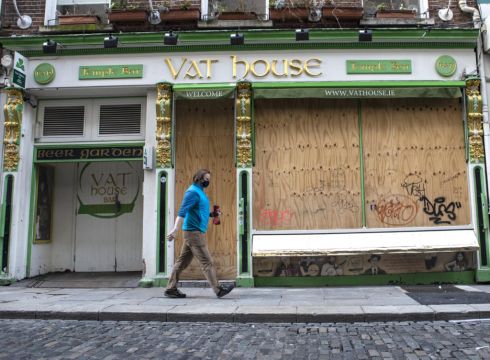The European Commission has invested hundreds of millions of euro with a number of companies developing vaccines to ensure the availability of almost 800 million doses for EU citizens, an Oireachtas committee has heard.
Gerard Kiely, head of the European Commission Representation in Ireland, also said Europe has almost €4 trillion of funding “firepower” to deal with the fallout of Covid-19.
Mr Kiely told TDs and senators almost a quarter of the EU’s GDP has been allocated to deal with economic and medical issues created by the pandemic.
The committee heard the Commission has concluded agreements on behalf of all EU Member States with AstraZeneca for the purchase of 300 million doses of the vaccine, with an option to purchase 100 million more; Sanofi-GSK for the purchase of 300 million doses; Johnson and Johnson for the initial purchase of 200 million doses, and could further purchase up to an additional 200 million vaccine doses.
Mr Kiely said the commission is also involved in what he described as “exploratory talks” with CureVac, with Moderna, and with BioNTech-Pfizer for millions more doses.
Mr Kiely said: “If you add up everything that has been done at EU and member state level in relation to Covid – between state aid, monetary easing, the funds, the EU budget – there’s a firepower of something of the order of €3.5 trillion to €4 trillion on the table in relation to dealing with Covid, dealing with the economic and medical fallout from Covid.
If the vaccines... are given the all clear in the next weeks, it is going to take a long time to get up to speed... in producing the billions of doses that are needed.
Mr Kiely was speaking by video-link on Wednesday at the joint EU affairs committee which was examining the bloc’s response to Covid-19.
It comes as a senior medic at the World Health Organisation warned on Tuesday that European governments are “well behind” in the fight against coronavirus and the continent is becoming an epicentre for the disease.
Vaccine date
Asked about recent reports suggesting EU officials had warned it could be 2022 before a Covid-19 vaccine is available to all in the bloc, Mr Kiely said it is “not a question of the Commission knowing something” and that it is “just the reality”.
He added: “If the vaccines – and there are very positive signs at the moment – are given the all clear in the next weeks, it is going to take a long time to get up to speed in terms of getting up to speed in producing the billions of doses that are needed.”
He said it is “just a statement of fact” that it could be 2022 before everyone in Europe may have access to a vaccine.
“I don’t think anyone is disrupting the fact that, if and when, a vaccine is available, it is going to be coming piecemeal,” he said.
“Member states are going to have to decide who is the priority – frontline workers, people with underlying problems.”
When Covid-19 hit us, this became the moment for Europe. And one, in my view, where we have risen to the occasion.
He told the committee in his opening statement: “When Covid-19 hit us, this became the moment for Europe. And one, in my view, where we have risen to the occasion.
“EU member states’ health systems immediately went into overdrive to counter the contagion and support those affected.
“However, member states also started closing borders, limiting the flow of essential goods. Some started to compete with each other for the procurement of limited supplies of PPE and medication. In addition, the economic effects of lockdowns had to be met by national social security systems and national financial support to businesses and workers.”
But he added that in recent months, EU citizens had “rediscovered the value of what we hold in common” and member states have showed what is possible when there is trust in the European institutions.
“Working within its competences, and sometimes moving beyond into innovative areas, the EU has given a massive response to Covid-19,” he said.







